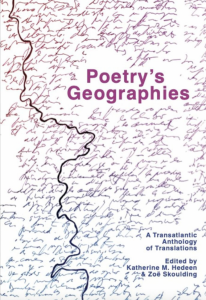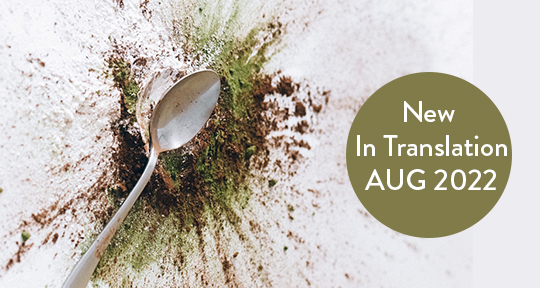As the world reverberates with the powers and consequence of language, this month’s round-up of translations are especially resonant with their assertion of how texts can subvert, heal, and ascribe meaning to life. Below, find reviews of a text that gathers poetry and its translators in boundary-defying dialogues of methods and ideas; a novel that powerfully uses silence to address the transgenerational trauma of the Rwandan genocide; and a sensitive story of an Iran on the precipices of change by celebrated modern novelist Simin Daneshvar.

Poetry’s Geographies: A Transatlantic Anthology of Translations, edited by Katherine M. Hedeen and Zoë Skoulding, Eulalia Books, 2022
Review by Laurel Taylor, Assistant Managing Editor
How does one review a translation (or rather a set of translations) which center the translator? This is the question I’ve been asking myself as I make my way through Poetry’s Geographies: A Transatlantic Anthology of Translations, edited by Katherine M. Hedeen and Zoë Skoulding. This ambitious collection is unique in bringing together translation practitioners from the heart of the Anglosphere and giving them a space to speak about their practices—what Hedeen might describe as “countermapping,” what Don Mee Choi might describe as “lilymethod” mapping, and what Erin Moure might call “in”mapping.
As you may have gathered from this description, Poetry’s Geographies begins not with the text-in-translation but with the translator, with their essays and methods which speak in sometimes contradictory, sometimes complementary dialogues. Through these, we, the readers, are asked to sit with the very contradiction of translation itself—the notion that one language can be “deformed” or “twinned” or “exploded” into another. Indeed, the acknowledgement of this impossibility, the greatest and most repeated cliché concerning poetry and translation, drives the collection. As Skoulding writes in the introduction, “Rather than making the world more transparent and ‘accessible’ for quick consumption, poetry and its translation can sustain opacité…as an opaqueness that allows the Other to exist in full, not to be reduced or subordinated.” Put differently in the essay from Sasha Dugdale:
I stand against this idea of translation as a vitrine in which we see the original. I stand against it here, me, many kilos of proteins, lipids, water, with a slow local history of my own composition and concurrent decomposition (I see also that it is a grave act to scribble in these lines)
no person is a pane of glass no person is of pure intent no person is devoid of history
In this approach, the notion of language as a window is cast aside. Language is smoke and mirrors (me). Language is air (Ziba Karbassi). Language is sound (Skoulding). Language is an infestation (Moure). Language is a sufism (Stephen Watts). Poetry’s Geographies asks us to stare into the mist and watch the swirling shapes, the fleeting shadows, the forms familiar, menacing, and absent. The thing we perceive, in Hedeen translating Victor Rodríguez Nuñez, may in fact be absence:
your existing is not shaped
from the knot that resembles the foliage weave
your being is not shaped
from the board sanded down by countless downpours
barely the keyhole owl eye
to look inside so nothing was left outside
an image in heatfertilized by the void


